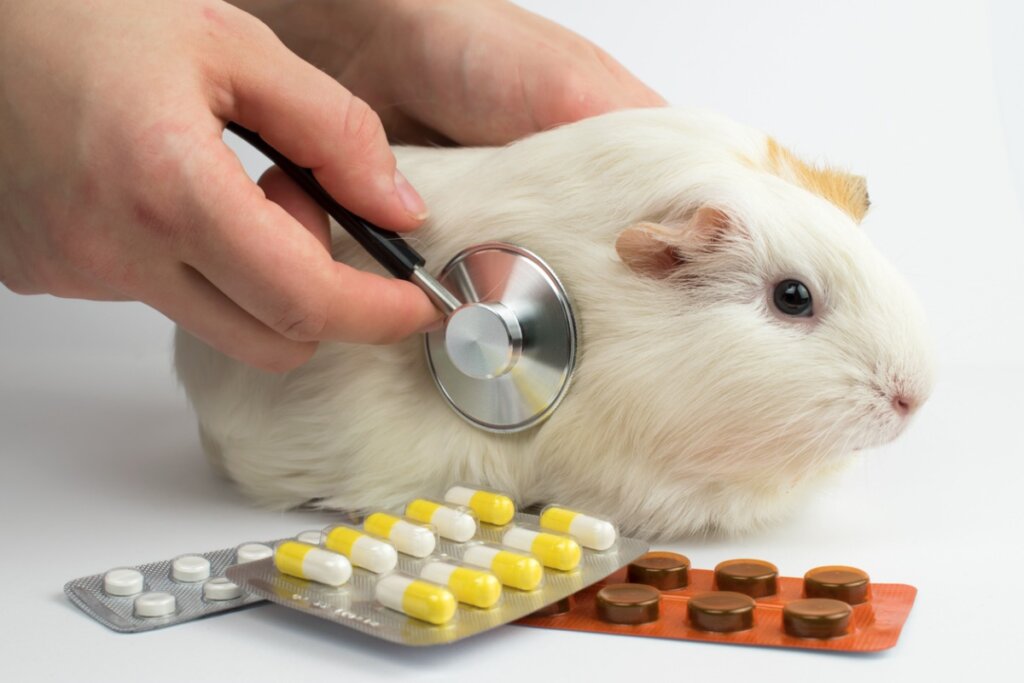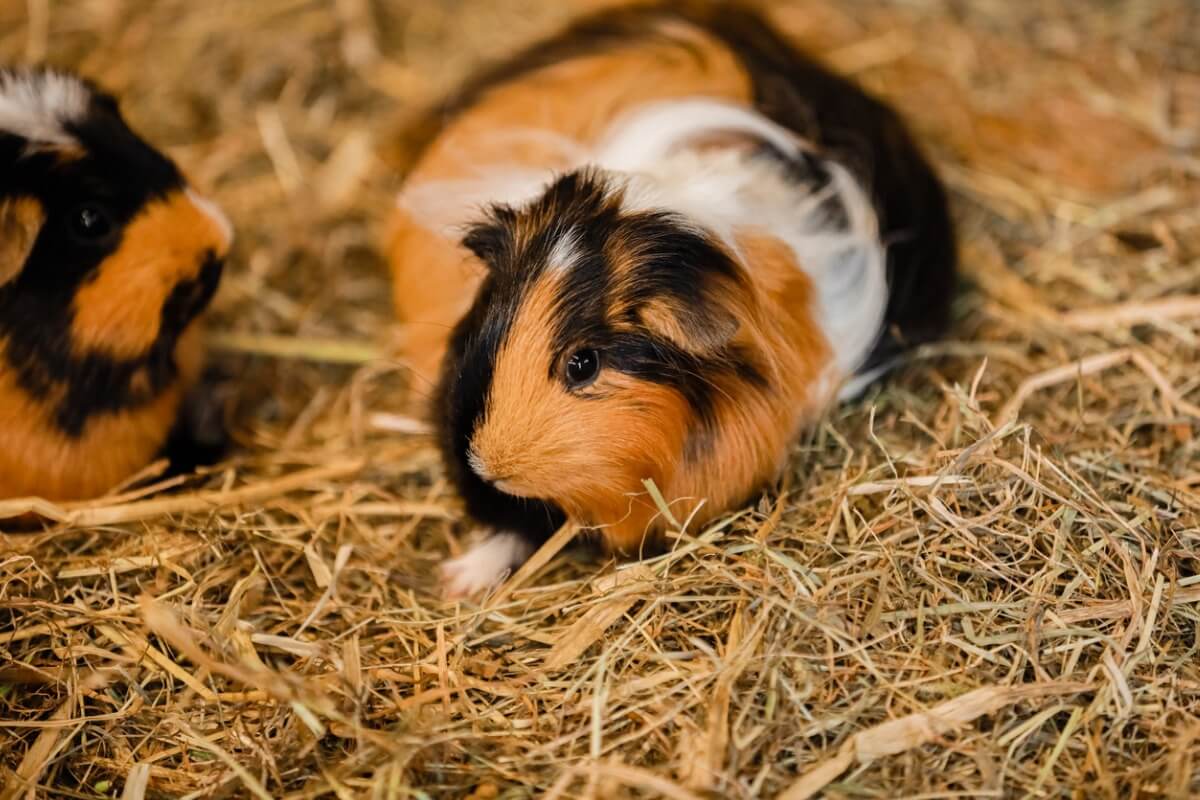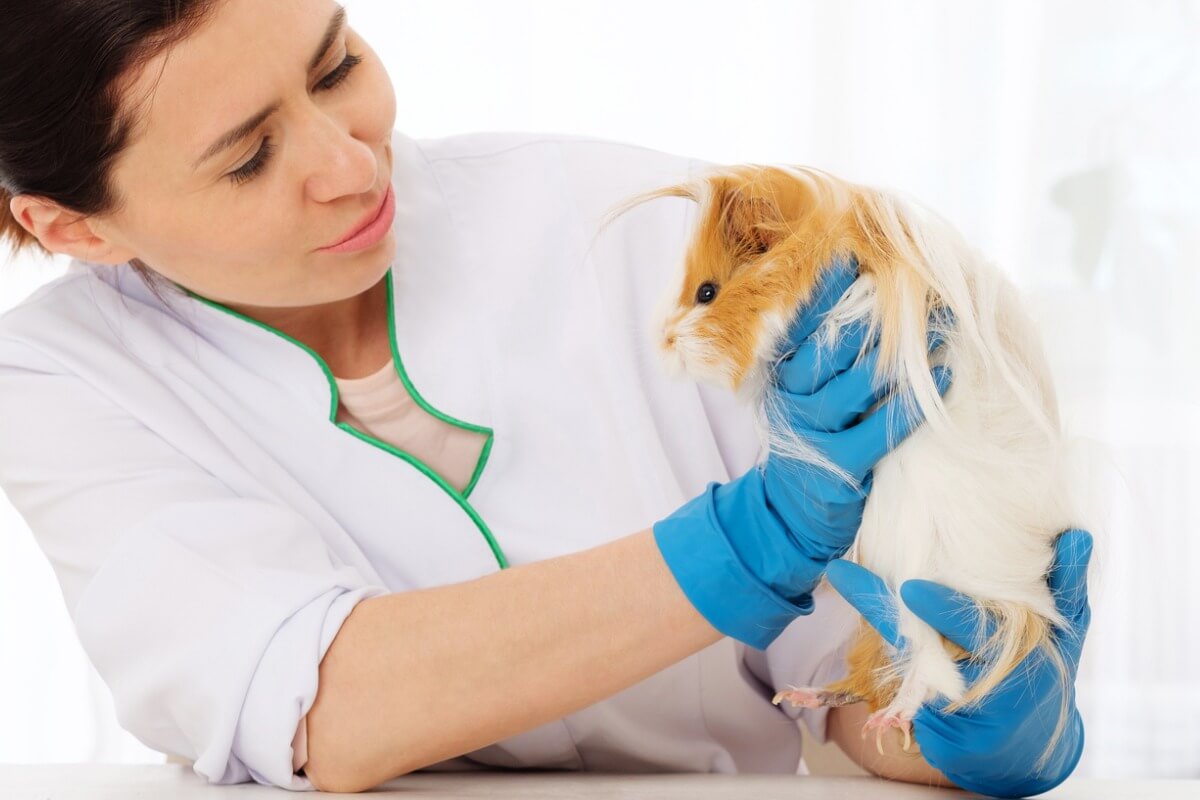12 Common Diseases in Guinea Pigs

Guinea pigs are usually one of the easiest pets to care for. In addition to this, they’re charismatic and look really cute, which has made them quite popular pets. However, there are some common diseases in guinea pigs that can endanger their lives, so it’s best to be vigilant.
The scientific name of this pet is Cavia porcellus, which is part of the group of capybaras. Read on and find out all about the most common diseases in guinea pigs.
Why do guinea pigs get sick?
Guinea pigs withstand adverse conditions quite well in their habitat, and so it’s unusual for them to get sick. In fact, in some cases, certain bacteria or viruses are found inside the animal’s body, but are only noticeable when they become severe. In general, most of the problems with this rodent occur due to the following factors:
- Old age: As they get older, guinea pigs are more susceptible to a number of common diseases.
- Dental problems: These can be caused by heredity, injury, or nutrient deficiencies.
- Metabolic problems: Caused by heredity, which are also related to diseases in reproductive organs, or acquired throughout their lives.
- Accidental injuries: Falls, blows, cuts, or carelessness during handling.
- Inadequate habitat conditions: This is when feeding, cleanliness, humidity, temperature or habitat characteristics don’t meet the minimum requirements to ensure the welfare of the animal.

What are the most common diseases in guinea pigs?
Guinea pigs can get bacterial, viral, parasitic, and hereditary diseases. However, many of these diseases only appear when the animal’s quality of life is affected. Therefore, if the pet has been exposed to sudden changes in the conditions of its habitat, it’s likely to develop some pathology.
To prevent this you should be aware of any change in the habits of the guinea pig. If you identify any unusual behavior in your pet, consult a veterinarian immediately, as the health of your small rodent may be at stake. Listed below are some of the most common illnesses and diseases in guinea pigs.
Diarrhea
The most obvious symptom of this condition is the passing of watery stools, which are often accompanied by weight loss, lethargy, and a loss of appetite. As soon as you notice any of these warning signs, go to the vet so they can make the correct diagnosis.
This condition is caused by bacteria, parasites or viruses that affect the digestive system of the pet. Although it may seem a minor event, if it isn’t treated promptly, the guinea pig can become dehydrated and die. Don’t try, under any circumstances, to self-medicate, as you can worsen the animal’s health.
Dental problems
In these cases, the main symptom is excessive drooling from the mouth, which is associated with a problem with the guinea pig’s teeth. The usual cause is a bad alignment of the teeth (malocclusion), which causes difficulty in eating and closing the mouth. Sometimes this is accompanied by weight loss, bleeding gums, and abscesses in the mouth.
Similarly, the best solution is to go to the vet immediately, because only they can diagnose the pet well. It’s likely to take more than one visit to solve the problem, but this will be indicated by the professional at the time of treatment.
Conjunctivitis
The most obvious manifestations of conjunctivitis are red eyes, tearing and crusting around the eye area. This condition is usually caused by a bacterial infection, so it’s necessary to see your vet for appropriate treatment.
Scurvy (vitamin C deficiency)
Like humans and other animals, guinea pigs aren’t able to produce their own vitamin C. Therefore, if their diet is deficient in vitamin C, they should be treated by a veterinarian. If their diet is deficient in this micronutrient, the pet will begin to show weakness in the muscles, loss of energy, weight loss, and diarrhea.
The consequences of a late diagnosis are fatal, so you need to go to the vet at the slightest sign of the disease. In fact, according to the MSD Veterinary Manual, some diets fortified with vitamin C aren’t very efficient. This is because much of this compound is lost when exposed to light, humidity, and heat.
Pneumonia
This is one of the most common causes of death in guinea pigs, as the respiratory infection usually worsens in a short period of time. The main symptoms of this disease include difficulty breathing, runny nose, conjunctivitis, sneezing, fever, and lethargy. It’s caused by pathogenic microorganisms.
As if this weren’t enough, this pathology is quite contagious, so if you have more than one pet together it’s certain that the companion will also be infected.
Ketosis
This disease is caused by a metabolic problem, which causes harmful molecules to be produced within the body (ketones). This is quite common in the last 2 to 3 weeks of a guinea pig’s pregnancy and can lead to miscarriage or the death of the fetuses.
Ketosis also affects overweight animals, which can lead to complications if the diet is inadequate. Among the most obvious symptoms are decreased appetite, loss of energy, muscle spasms, and clumsiness when walking. Despite this, in some cases, there are no signs, and sick individuals die suddenly.
Tumors or cysts
Guinea pigs are susceptible to tumors or cysts in different parts of the body. The most common places are the skin, ovaries, and chest (mammary glands). For a good early diagnosis remember to take your pet to the vet regularly (especially if it’s over a year old).
External parasites (ectoparasites)
Skin problems are very common in these small rodents and are quite obvious, as they cause hair loss. This is usually caused by arthropods (mites or lice) or fungi. They aren’t usually difficult to treat.
The most frequent symptoms are itching, skin inflammation, and hair loss. The biggest problem in these cases is the great possibility of contagion, as it’s quite difficult to control the presence of these parasites.
Pododermatitis
This condition is caused by a bacterial infection in the sole of their feet, which causes inflammation in the whole area. However, it’s a side effect of neglecting wounds on the guinea pig’s feet, as this is the only way the bacteria can enter the body.
The most common cause is the use of metal cages without any kind of floor, which causes wounds on the pet’s feet if you’re not careful. Similarly, being overweight and a lack of cleanliness lead to infection, so it isn’t wise to leave the habitat dirty for too long.
Urinary problems
Guinea pigs are very prone to develop urinary stones, which are small stones that form in the bladder. As a result, the urethra can become blocked by one of these structures, preventing the pet from urinating easily. Depending on the veterinarian’s assessment, the pet may need some surgical intervention.
Abscesses
Abscesses look like a globular swelling containing pus-like fluid. This is caused by an infection affecting the skin, lymph nodes, gums, eyes, and internal organs. Most of these nodules must be removed by a veterinarian, as they require special treatment and surgery.
Hyperthyroidism
Hyperthyroidism used to be a fairly rare disease in guinea pigs, but has recently become more widespread. This may be due to the increased popularity of the pet, which raises the number of documented cases for this condition.
This disease causes the body to produce excessive amounts of thyroid hormones, causing several different problems in the guinea pig. Among the most common symptoms are weight loss, hyperactivity, tachycardia, hair loss, and prolonged periods of sleep.

How do I prevent these diseases?
To begin with, the diet and habitat need to be in optimal condition, because most of their health depends on it. Remember that guinea pigs are usually delicate animals, so any deficiency in their care can lead to the development of diseases.
In addition to the above, remember that most of these diseases cause a change in behavior. Therefore, if your pet is behaving differently from usual, it’s best to go to the vet for a general checkup. Keep in mind that an early diagnosis can save your guinea pig’s life.
All cited sources were thoroughly reviewed by our team to ensure their quality, reliability, currency, and validity. The bibliography of this article was considered reliable and of academic or scientific accuracy.
- Quesenberry, K. E. (1994). Guinea pigs. Veterinary clinics of North America: Small animal practice, 24(1), 67-87.
- Minarikova, A., Hauptman, K., Jeklova, E., Knotek, Z., & Jekl, V. (2015). Diseases in pet guinea pigs: a retrospective study in 1000 animals. Veterinary Record, 177(8), 200-200.
- Kraemer, A., Hein, J., Heusinger, A., & Mueller, R. S. (2013). Clinical signs, therapy and zoonotic risk of pet guinea pigs with dermatophytosis. Mycoses, 56(2), 168-172.
- Roberts-Steel, S., Oxley, J. A., Carroll, A., & Wills, A. P. (2019). Frequency of Owner-Reported bacterial infections in PET guinea pigs. Animals, 9(9), 649.
- Quesenberry, K. & Donnelly, T., (2021). Disorders and Diseases of Guinea Pigs – All Other Pets – MSD Veterinary Manual. [online] MSD Veterinary Manual. Available at: https://www.msdvetmanual.com/all-other-pets/guinea-pigs/disorders-and-diseases-of-guinea-pigs
- Llona, M. T., Sánchez, A., Rodríguez, S., & Guerra, R. (2016). Diagnóstico y tratamiento de hipertiroidismo en cobayas (Cavia porcellus). A propósito de un caso clínico. Clínica veterinaria de pequeños animales: revista oficial de AVEPA, Asociación Veterinaria Española de Especialistas en Pequeños Animales, 36(3), 197-204.
